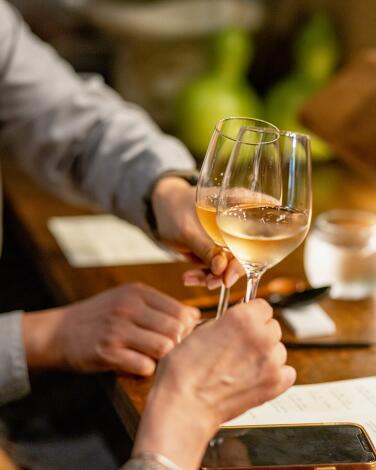This must be the Arts District
Visitors don’t come to the Arts District to escape from city life: This is downtown Los Angeles, and the neighborhood is gritty. But it’s also a vortex of creative energy with a thriving community built on legacies of art, punk and industry.
Get to know Los Angeles through the places that bring it to life. From restaurants to shops to outdoor spaces, here’s what to discover now.
The Arts District has its own urban geography: Sandwiched between the Los Angeles River rail yards and Alameda Street, its bridges and roads are thoroughfares for commuters and freight barreling to and from the nearby 10, 101 and 5 freeways.
Here among the warehouses and truck depots is a nexus of independent galleries, public art, edgy shops and some of the best restaurants and cafes in the country. Just beyond 1st Street was the city’s original red-light district. And before it was the Arts District, the area was known as the Warehouse District. Continuous new construction — including its first (and controversial) high-rise — promises future transformation.
Downtown is made up of several neighborhoods, and over the course of a decade I’ve lived in its Historic Core, Little Tokyo and Arts District, each of them profoundly distinct. Friends in the core jokingly call the Arts District “the suburbs of downtown.”
That’s partly because the Alameda Corridor divides it from the more densely populated historic center, Skid Row, Little Tokyo and Olvera Street. It’s also subtextual commentary on the sprawl of housing and retail developments, encroaching on the once-inexpensive lofts that drew artists here in the first place. (What used to be a bar that was the epicenter of L.A. punk rock is now a store selling T-shirts that say “Brentwood Swim Club.”)
But the idiosyncratic spirit of the Arts District remains palpable. At night, thumping warehouse raves at the southernmost part of the neighborhood, impromptu takeovers on the 6th Street Bridge (fireworks and drag races included) and swirls of people around the bars and galleries at Joel Bloom Square, which is actually a triangle, are reminders of the brilliance and allure of living in a city where it feels as if anything can happen.
The late Bloom, with the eponymous “square,” was a beloved community activist who owned a general store on Hewitt Street. “I get a feeling here I haven’t gotten anywhere else,” he said in a 1994 interview with the L.A. Times. “It may look desolate, but it’s not. There’s no place I’d rather be.”
On the south fringes are abandoned buildings, piles of detritus, parked big rigs. But also, members-only club Soho House; Maru, arguably the most stylish coffee shop in L.A.; Bestia, one of the hardest reservations anywhere; and avant-garde clothing boutiques such as H. Lorenzo and Dover Street Market. Some alleyways you avoid, and some lead you to a secret movie theater, mural, gym, teahouse or tacos.
The north half of the Arts District is a playland of bars, breweries, restaurants, galleries and stores. The international art gallery Hauser & Wirth established itself as a central hub when it debuted in a former flour mill on 3rd Street in the spring of 2016. But the artist ghosts of another generation might haunt the American Hotel (the building with Kent Twitchell’s giant mural of Ed Ruscha overlooking Bloom Square) around the corner on Traction, where the punk scene at legendary Al’s Bar blazed in anarchic fashion until the club closed in 2001. They probably never expected a Kreation juice bar would open across the street.
Nearly 200 years ago the whole area was the source of a different kind of juice: cabernet. Those vineyards gave way in the late 19th century to orange and grapefruit groves, where the story of the Arts District as we know it began. The warehouses and depots built to support the packing and shipping of citrus laid the foundation for the neighborhood’s architectural character (which also helps make it one of the world’s most filmed locations). Factories overtook the citrus groves, and when the factories emptied between the 1950s and ’70s, artists moved in, creating live-work spaces.
Jump to the present, and the 35-story mixed-use high-rise looming above the 4th Street Bridge is nearing completion. (It was connected to a corruption scandal centered on former City Councilmember José Huizar and bribes from real estate developers.) Several hundred new apartments have been built at Alameda and Industrial, with more to come. Film production studios are taking over old warehouses. A brand-new shopping center on Traction called Signal brings luxe retailers including Flamingo Estate, M5 Shop, Lawson Fenning and Alchemy Works.
The neighborhood keeps changing. For many who live, work and play here, there’s still no place they’d rather be.
What's included in this guide
Anyone who’s lived in a major metropolis can tell you that neighborhoods are a tricky thing. They’re eternally malleable and evoke sociological questions around how we place our homes, our neighbors and our communities within a wider tapestry. In the name of neighborly generosity, we included gems that may linger outside of technical parameters. Instead of leaning into stark definitions, we hope to celebrate all of the places that make us love where we live.

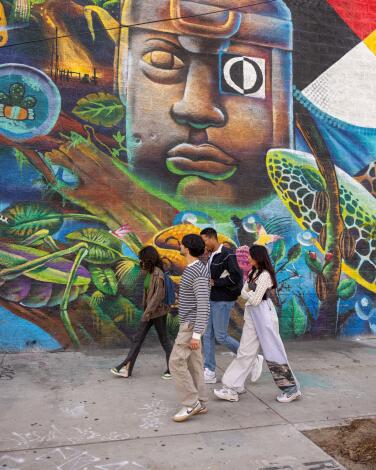
View the 'Undiscovered America' mural on 4th Place
You’ll see dozens of murals throughout the Arts District, including JR’s “Wrinkles of the City,” “La Abuelita” by El Mac, “Ed Ruscha” by Kent Twitchell and Jen Stark’s “Chromatic Cascade.”
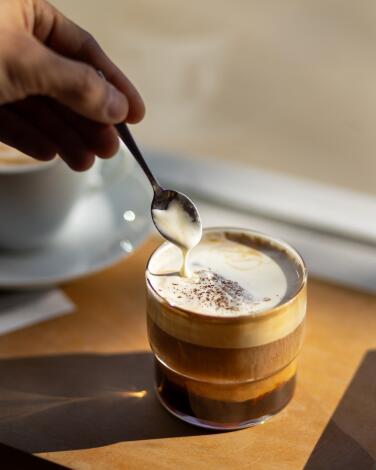
Start your day with a Cream Top at Maru coffee shop
But Maru Coffee stands out as a local company roasting its own beans with attention paid to its brewing techniques, service, design and atmosphere. Bigger than the original Los Feliz location, the downtown Maru usually has a shorter line but can get crowded, especially on the weekends.
Its best-known specialty drink is probably the Cream Top, a take on the popular-in-Korea versions of the Viennese Einspänner, which is usually iced coffee topped with thick whipped cream. Was Maru the first to introduce the Korean-style Einspänner to L.A.? Maybe. Regardless, its rich, sweet whipped cream layer is so lush it’s velvety.
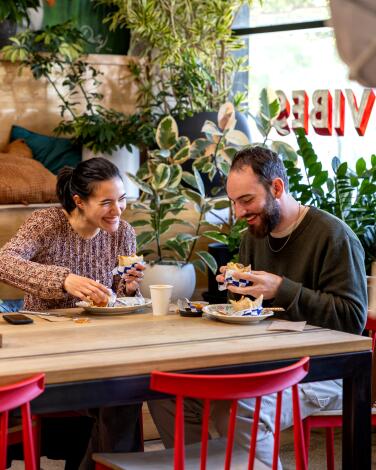
You're here for the breakfast burrito at Guerrilla Cafecito
Now, Guerrilla Tacos is the full-fledged restaurant helmed by Brittney Valles; it offers excellent tacos and a compelling tequila and mezcal list. Right next door is Guerrilla Cafecito, serving coffee and breakfast daily. Locals (and visitors to the neighborhood) come for the hefty breakfast burrito, larger than a brick, known as the GTLA burrito. It’s stuffed with eggs, steak, hash browns, cheese, avocado and salsa. It’s big enough to share.

Shop for City Pop records and home goods at the Good Liver
An elegant tea bar in one corner of the store is a fairly recent addition, featuring teas from Kettl and occasional tastings and classes. And Youn keeps expanding. If you’re a fan of City Pop — the style of Japanese pop music associated with emerging Western influences in the 1970s and ’80s — newly custom-built shelving holds a collection of LPs. And through a side door, a new stationery shop is now connected to the store.
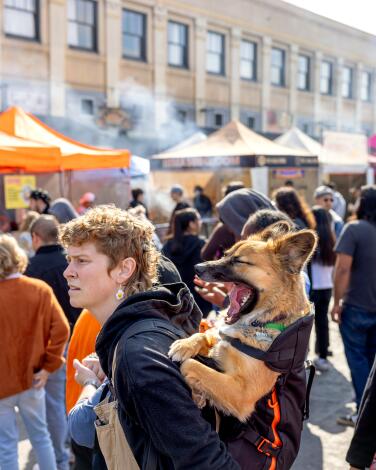
If it's Sunday, it's Smorgasburg
Crowds beeline to Chimmelier’s Korean fried chicken sandwiches. But also try Goat Mafia’s birria tacos in the “L.A. style,” with a cheesy crust; Love Hour smashburgers; pork belly breakfast tacos at Macheen; and Kinrose’s Middle Eastern ice cream in flavors such as brown sugar and spiced walnut, topped with crumbled baklava. The Armenian skewers grilled over almond wood at III Mas Barbecue are spectacular, marinated with Chaldean curry, tamarind and tarragon, and served with aish baladi pita.
The new year always brings a new lineup of vendors. And every quarter, the Smorgasburg L.A. Art Fair, curated by the neighborhood’s Art Share L.A., features artisan vendors and live performances for a day of music, art and food.
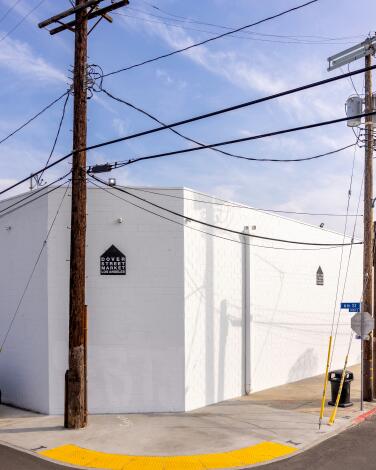
For avant-garde fashion, step into Dover Street Market
It’s a maze of cutting-edge fashion in here. Brands are organized between art installations — from artists such as Björn Dahlem, Yuichi Higashionna, Gary Card, Stuart Haygarth, Warren Muller and Lyn Dillin. Some labels you might recognize and some you might not. Find the latest sneaker collab between Bone Soda and Salomon, watches collected by Dimepiece, Cecilie Bahnsen and Bottega Veneta pre-spring 2024 collections and rare Hermès bags curated by vintage-shop-to-the-stars What Comes Around Goes Around.
The in-store cafe is Rose Carrarini’s Rose Bakery, with a sunny patio out back.
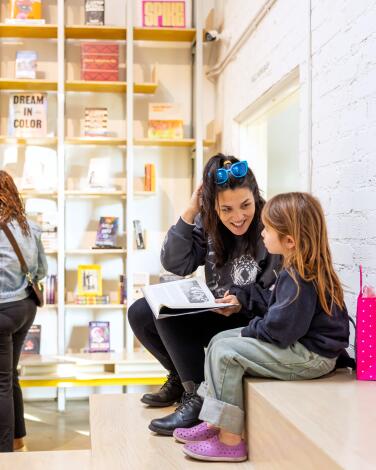
Move over, MOCA. Check out the Institute of Contemporary Art
The flexible art hall is also a community space. A recent neighborhood posada gathered attendees for an art workshop with Milatido and Mercedes Gertz and an exhibit by elementary students at Para Los Niños, whose charter school is located down the street. Families sat at long tables wrapping yarn around tree branches, sharing tamales and champurrado and listening to live band Cumbia Quest.
ICALA’s bookshelf residency promotes local booksellers and independent publishers, showcasing titles available for sale and public programs. Browse the shelves, which recently featured concept bookshop Reparations Club and titles including Marilyn Nance’s “Last Day in Lagos,” Nadine Ijewere’s “Our Own Selves” and “Forothermore” by Nick Cave.
Also, the museum is free.
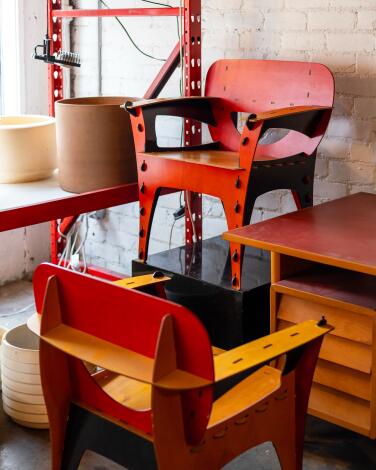
Find Midcentury Modern treasures at Motley
Motley specializes in vintage Midcentury Modern designs from Denmark and modern and contemporary art from California. Its 7th Street showroom is packed with furniture — dining chairs, tables, desks, sofas, rugs and textiles, tableware and shelving, such as the modular 1970s Cado Royal System. A small space is devoted to vintage clothing. Find daily sale items in its outdoor parking lot.
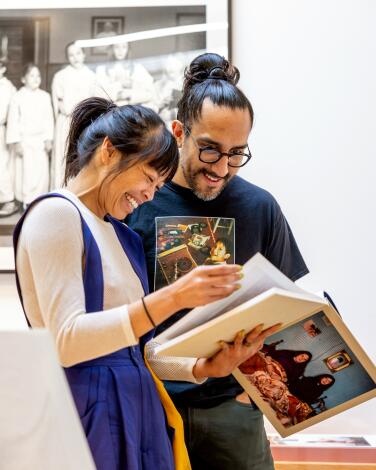
Drop into an art opening or book signing at Webber Gallery
This is the second gallery location from London-based Webber. Founder and curator Chantel Webber said she was drawn to the Arts District and particularly Santa Fe Avenue because it “feels like New York, and the street and gallery scene are growing.” The street is an artery of galleries that extends from the Arts District and just south, beyond the 10 Freeway, and includes Good Mother, Vielmetter, Night Gallery, Francois Ghebaly, Wilding Cran, Abigail Ogilvy and more.
Other must-visit galleries in the Arts District include Luis De Jesus and the Box (see also: the Institute of Contemporary Art Los Angeles and Hauser & Wirth).
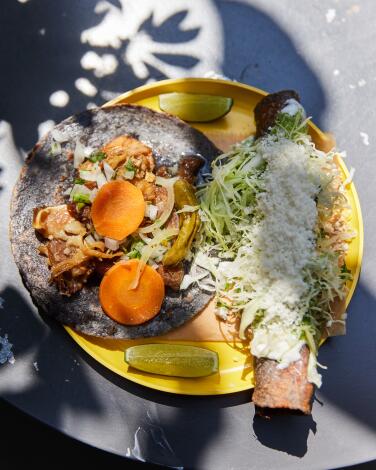
Snack on a crispy flauta in a back alley at Ditroit Taqueria
The tortillas for long, crispy-crunchy flautas are filled with swordfish and fried in rice bran oil, then topped with shredded lettuce, salsa de aguacate, crème fraîche and queso fresco. Each bite is an explosion of textures and flavors.
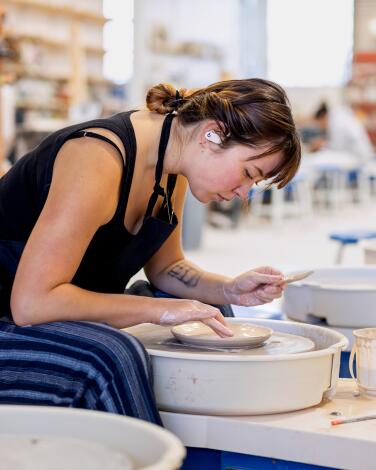
Take a pottery workshop at Still Life Ceramics Studios
Classes include one-hour workshops, such as its Bowl in One lesson offered on Fridays and Sundays: Sign up to learn how to throw a bowl on the potter’s wheel, no experience necessary. Make a bowl, then choose a glaze; the studio will glaze and fire it for you (you’ll pick up your finished piece on a later date).
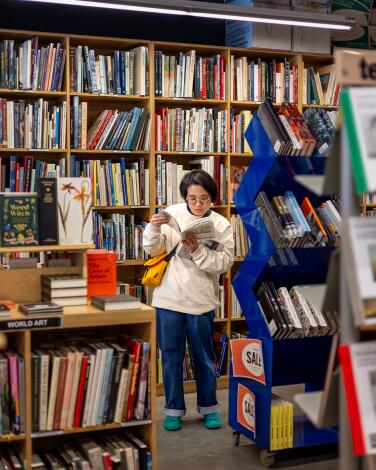
Buy an art book or magazine at Hennessey + Ingalls
With its roll-up garage door and inviting sunlit windows, Hennessey + Ingalls’ Arts District location makes for a casually edifying midafternoon pit stop. The family-owned store moved from the Westside (remember when it was on the 3rd Street Promenade in Santa Monica?) to the Arts District in 2016, across the street from SCI-Arc architecture school. Founded by Reginald Hennessey 60 years ago, it’s the largest art, architecture and design bookstore in the Western U.S. It’s no wonder that art directors come to shop the in-depth selection of books on art and art history, architecture, photography, interior design, graphic design and landscaping.
Love art books? See also Hauser & Wirth and the rotating library at the Institute of Contemporary Art.
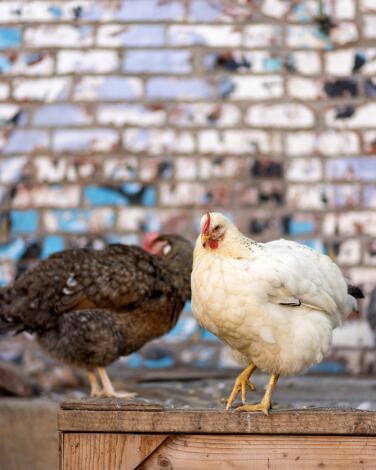
Find a secret wildlife habitat at Hauser & Wirth
Spaces that hint at the natural world are few to none in the Arts District, but you can find respite in the garden here, a hidden gem that is a certified wildlife habitat recognized by the National Wildlife Federation. Raised beds of herbs and vegetables are maintained for Manuela; a coop is dedicated to chickens; native plants flourish. If you’ve been walking around all day, the courtyard and garden are an idyllic place to rest.
Certainly, you should visit the exhibits, which recently have included works from artists such as Mike Kelley, Louise Bourgeois and Harmony Korine. But the bookstore, courtyard, garden (and chickens) also beckon.
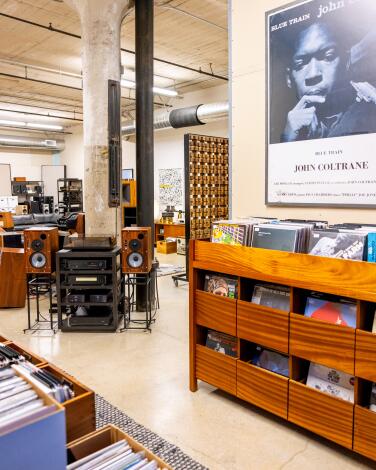
Geek out on world-class audio gear at Common Wave Hi-Fi
Founder Wesley Katzir guides customers through different audio scenarios and discusses what kind of music you like, and where you’re listening to it, to help figure out your setup. The store also hosts occasional events: musical performances, DJ sets and listening parties.
Walk into Common Wave and the first thing you’ll see are the records, a good place to start if you’re not in the market for a new stereo. But you probably soon will be.
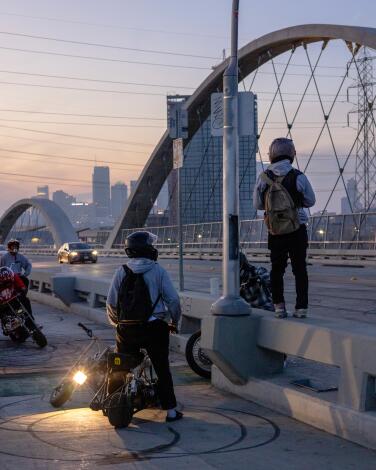
Take a sunset stroll on the 6th Street Bridge
It’s a good-time bridge that also affords stunning sunset and sunrise vistas of the downtown and Boyle Heights skylines. To the north you can see all the way to the San Gabriel Mountains. It’s also a great vantage point for viewing the murals below, including Royyal Dog’s “Peace to You,” depicting Rihanna in traditional Korean hanbok. And it has its own social charisma. Joggers and flaneurs from both sides of the bridge always say hello when passing each other. Where else in L.A. does that happen?
Pro tip: You can take a partial walk across the bridge by using the helical ramps at about its halfway point. The spiral walkway leads to an undercrossing that takes you to the other side.
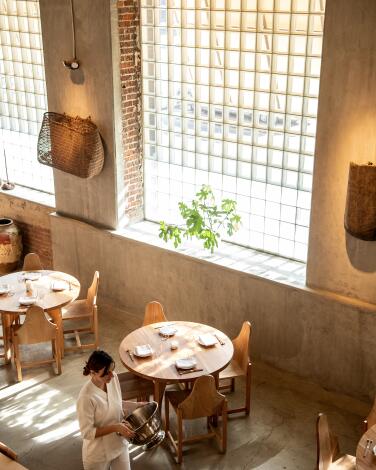
Try for a bar seat at Zen-like Yess and order chirashi
His dish called monk’s chirashi is inspired by time spent cooking at a Buddhist monastery outside of Kyoto: a bowl of seasoned rice topped with pristine vegetables, nuts and/or fruit, such as walnuts smoked in their own shells, dried sliced mandarins, Asian pear, roast pumpkin and pickled sunchokes. The dining room is reserved for tasting menus, but at the long wood bar (each of the 42 seats is made from surplus wood from Ise Jingu shrine in Japan) you can order a la carte, available for walk-ins only. It is worth giving it a shot.
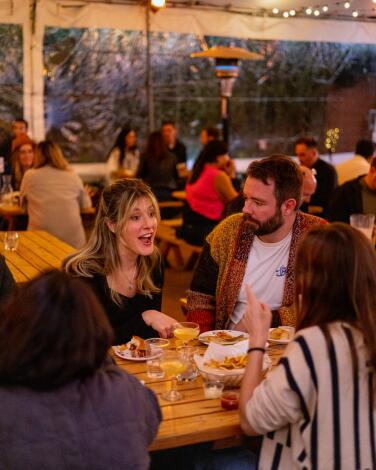
Have a cocktail on the patio at Everson Royce Bar
Where other Arts District bars might feel niche or scene-y, ERB is a one-size-fits-all kind of a bar. The patio accommodates large parties; you can order platters of burgers and fried chicken with flaky buttermilk biscuits and pitchers of cocktails. Or if you’re solo, the bar inside is welcoming, whether you want dinner, snacks or drinks (or all of the above).
The cocktails are thoughtful, with combinations of fresh ingredients in flavor profiles that keep the list interesting but lean fairly fruity. (The Teaches of Peaches combines vodka, white peach, tamarind, basil and lemon.) The wine list is smart, and the beers won’t disappoint aficionados either. On Thursdays, Friday and Saturdays it’s open until 2 a.m. Sometimes there’s a dance party.
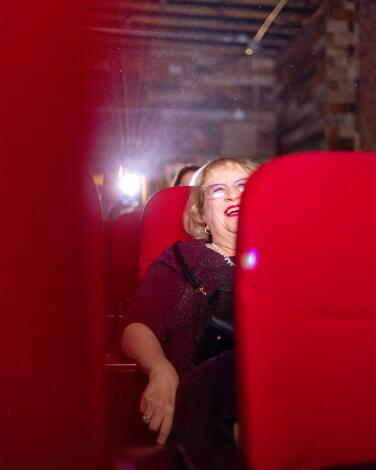
Watch a favorite cult film at Secret Movie Club
Founder Craig Hammill is the principal programmer and devotes the space to the club’s most avant-garde and hard-to-find movies, as well as readings, Q&As with filmmakers, workshops, premieres and occasional dance parties. A filmmaker himself, Hammill started the movie club when he was a USC student and is quick to point out that the films aren’t just about what he likes. “We ask people, what movies do you want to see?” he says. “One of the dangers is that a programmer will have a certain taste and not even realize they’re repeating themselves. Anime and Godzilla movies were holes for me. We try to be hive-minded.”
Recent screenings featured “Children of Men” as a postapocalyptic nativity story for the holidays; “Run Lola Run”; an Alfred Hitchcock series with “The Wrong Man,” “I Confess” and “Strangers on a Train”; “Rumble Fish”; “Un Prophète”; and “King Kong vs. Godzilla,” the 1962 original on 35mm. The club is a creative incubator and community hub, with monthly open-mic nights as part of its Secret Filmmaking workshop series. (Parking is in the back on Wilson.)
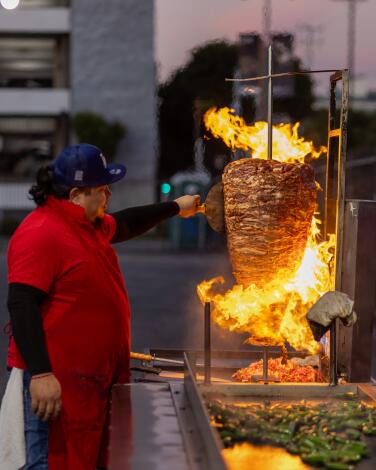
It's late. You want suadero at Ave. 26 Tacos
The spit for al pastor is always enticing (deservedly so), but a favorite here is the suadero, beefy chunks of meat prepared carnitas-style. A fried baby potato comes with every order. Add onions, cilantro and salsa at the condiments station. Eat immediately in the parking lot. Goodnight.
Subscriber Exclusive Alert
If you're an L.A. Times subscriber, you can sign up to get alerts about early or entirely exclusive content.
You may occasionally receive promotional content from the Los Angeles Times.


